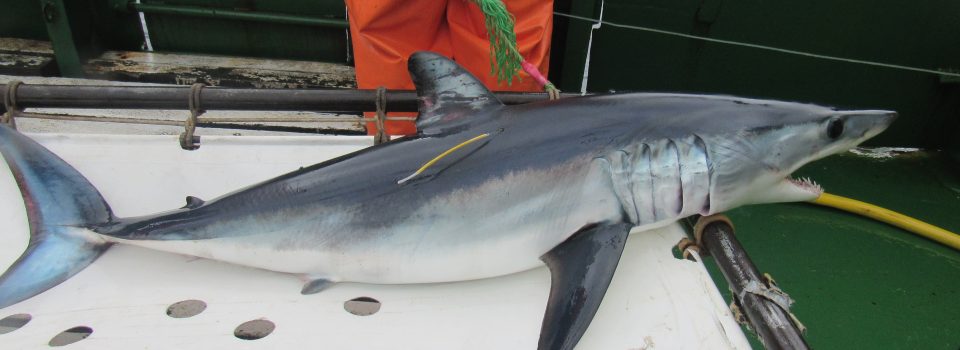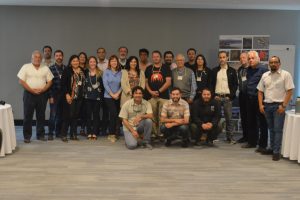TNC and IFOP organize FishPath Workshops for Mako and Blue shark fisheries in Chile
February 25th, 2020The Nature Conservancy (TNC), jointly with (IFOP) Fisheries Development Institute , organized several workshops aimed at the use of FishPath tool and process and data exploration and review for Mako Shark (Isurus oxyrinchus) and Blue shark (Prionace glauca) in Chile.
“FishPath is an interactive process, supported by an online tool, which allows fishery resource managers, fishermen and other actors in the fishery to identify, compare and discuss different fishery resource management options, in order to reach a capture strategy that helps the resource sustainability. The FishPath process and philosophy is based on the principle that each fishery requires an individualized approach to identify and solve existing challenges in a participatory way.
FishPath also includes identification and improvement of analysis and management capabilities aimed at the different actors involved in fishery. During the first workshop convened by IFOP and TNC, the workshop group applied FishPath process and tool for the identification of data collection options, stock assessment and management measures more appropriate for the context of the mako and blue shark fishery ”explained Natalio Godoy from TNC.
Dr. Patricia Zárate referred to the situation of mako and blue sharks “globally, the world’s leading authority in charge of inventorying the conservation status of animal and plant species, known as the International Nature Conservation Union (IUCN) it has in their Red List of Threatened Species (Red Book) the mako shark as Endangered species and the blue shark as Nearly Threatened.
In Chile, blue and shortfin mako sharks are caught in a targeted manner in the northern part of the country, but also as associated fauna mainly with dorado fisheries, swordfish and small pelagics. The majority of caught sharks correspond to juveniles and there are no administration measures that regulate their capture and protect the sustainability of these resources in the long term.
For fisheries administration, it is essential to have reliable, trustful and timely information that allows to properly support adopted measures. In this context, the Highly Migratory Resource Fisheries Monitoring project carried out by IFOP has collected biological and fishery information on the target species swordfish (Xiphias gladius), and secondarily from the mako sharks (Isurus oxyrinchus) and blue shark (Prionace glauca) since 2001 in industrial longline fleets, and since 2002 in artisanal longline, spinel and gillnet fleets to the present ”.
Regarding the workshop, Dr. Zárate commented “we learned how FishPath tool works to organize and document the information of shark fishery in Chile. On this occasion, there was different actors participation in the area, including scientific observers, researchers from different institutions of the country and the Undersecretariat of Fisheries and Aquaculture, who completed a dynamic questionnaire about fishery characteristics, including biological attributes and life history of the species, operational characteristics of the fleets, socio-economic aspects, as well as the regulations and laws that affect this fishery. Subsequently, data from the Highly Migratory Resource Fisheries Monitoring project carried out by IFOP was explored.
After the first FishPath workshop, a technical group led by Dr. Ricardo Amoroso, an expert in fishery resources evaluation and an external consultant at TNC, focused on the review, organization and exploration of fisheries IFOP collected data, with in order to propose a system to unite various data sources and use them in evaluations, as well as to gain available data better understanding ”
Dr. Ricardo Amoroso added “ FishPath tool was developed with the search for solutions for fisheries with poor data in mind. The case of shark fisheries in Chile is a bit different from other fisheries, since there is a follow-up program carried out by IFOP that allows deeper investigation into the status of the resource. However, the review and consolidation of all available information in a participatory workshop is a critical stage in data evaluation of fisheries with poor data, since it allows identifying main uncertainties and areas of improvement in the monitoring system. From FishPath process, several days were dedicated to this work and at a later stage another joint workshop will be carried out between TNC, IFOP, and other actors in which the analyzes suggested by the FishPath tool will be carried out to have a diagnosis of the resource state in order to guide management measures adoption ”.
“We will continue working with FishPath tool and process thanks to the collaboration with TNC in order to deliver options to evaluate and manage the fishery, along with its advantages and disadvantages, incorporating recommendations that may include catch limits, gear restrictions or a set of other strategies and to indicate the direction that we must follow for the correct fishing administration of these resources ”concluded Dr. Zárate.

